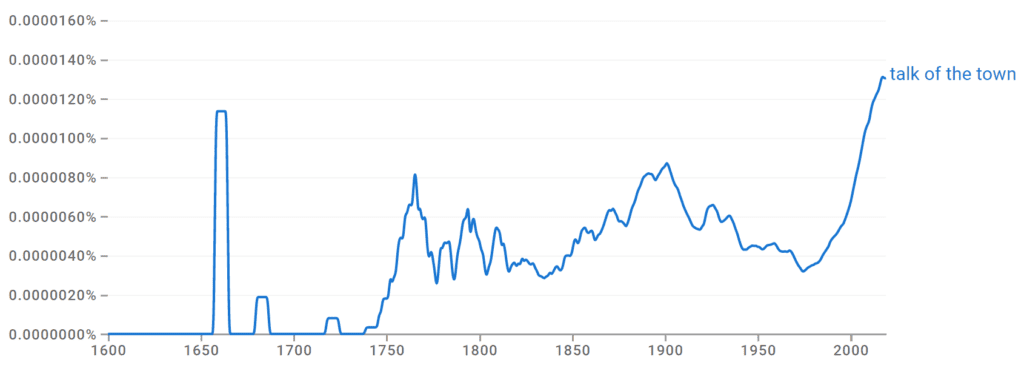Idioms are words and phrases with a figurative use separate from their literal usage. However, many idioms are easy to understand since the allusion they refer to is somewhat self-explanatory.
This is true of the idiom talk of the town. Its connotative meaning is relatively unchanged from its literal use.
Despite its figurative use, this idiom has a surprisingly long history and is fairly easy to understand. Let’s take a closer look at how you can use it in speech and writing to add clarity and detail for your audience’s understanding.
What Is the Meaning of the Phrase “Talk of the Town”?

When a person refers to the talk of the town, they are referring to an individual or information that is of particular interest being discussed by most people. The talk of the town is almost always a current subject and may be informational or simply gossip.
For example:
- The unveiling of the new statue in the park was the talk of the town, and residents gathered an hour in advance to see its debut.
- Their quick engagement was the talk of the small town, and rumors surrounding their relationship flew fast and furious.
- Her daring approach to the portfolio drew the attention she had been seeking, and the results were the talk of the town for months afterward.
Talk of the Town Synonyms
To help you further understand how to use talk of the town, consider these synonyms which can easily replace the idiom:
- Controversial issue
- Matter of the moment
- Scandal
- Grist for the gossip mill
- Uproar
- Hot potato
- Rumor
- War of words
For example:
- She leaned across the desk, whispering, “have you heard the latest scandal surrounding John and Kate’s relationship?”
- She leaned across the desk, whispering, “have you heard the latest grist for the gossip mill surrounding John and Kate’s relationship?”
- She leaned across the desk, whispering, “have you heard the latest uproar surrounding John and Kate’s relationship?”
Talk of the Town Origin

The expression talk of the town has been in use for thousands of years. Some of the earliest recordings are translated through Latin in Horace’s Satires, published between 35 and 30 BC, in which he replied to contemporary critics with “…me wantonly is going to be the talk of the town.”
Ovid also uses the expression in the third book of Amores, published in 16 BC, stating, “you’re the common talk of the whole city, and don’t see it, while you tell of your doings, with their past shame.”
The modern use of the expression became popular in the 1600s found in the Diary of Samuel Pepys, which was written in 1661: “Though he be a fool, yet he keeps much company, and will tell all he sees or hears, so a man may understand what the common talk of the town is.”
By the 1900s, the term was a regular part of everyday language. The New Yorker published an entire column dedicated to current articles of social interests dubbed Talk of the Town. This column is still running strong.
Let’s Review
When you hear the phrase talk of the town used in a sentence, it means very much what it suggests — that the information connected to the phrase is a hot topic of conversation. The talk of the town may be positive or negative but is almost always exclusively concerning current events.
This old term has lasted through thousands of years of use, with nods to its use translated from ancient Greek philosophers.
Check out some others we covered:
